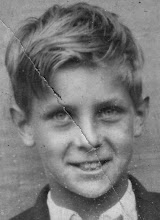For those who would otherwise not be interested, this is not about football.
In 1957, the man widely recognised as the world’s best footballer was Welshman, John Charles. 1957 was the year Leeds United sold him to Juventus for a world record transfer fee of £65,000. It was also the year that I did my ink drawing of John Charles. As is the case with all show-offs I took my drawing to school to show to my pals. One of them, whose name was Joe, told me he knew John Charles as he had him on his paper round. This was absolutely believable as, back in those days, the big soccer stars weren’t earning vast sums of money and it was common knowledge that the great Mr Charles lived in a modest semi -detached, not far from Elland Road ground.
Joe offered, for a modest fee of one shilling (5p), to show the drawing to John Charles and get him to sign it. I agreed to the deal and handed my drawing over to Joe. The next morning my drawing was returned, duly autographed by John Charles. I handed over my shilling and wasted no time in getting the drawing framed. For the next 35 years the treasured, signed drawing travelled with me to my various abodes then, in 1992, I was engaged by the famous darts commentator, Sid Waddell, to give an after-dinner speech at a sportsman’s dinner in Cleckheaton.
Being the guest speaker, I was at the top table, as was Sid Waddell and various other sporting luminaries. I was a bit taken aback to see the great John Charles, the biggest sporting luminary in the room by a mile, sitting at a table as a mere guest. Not an honoured guest, just one of the lads. I mentioned this to Sid who told me that John didn’t like having a fuss made over him. I got to my feet to make my speech and was overjoyed to see my hero laughing along with everyone else. So I, in my own small way, was entertaining the great man as he’d entertained me and millions of others over the years.
After the dinner I made my way over to speak to him. He told me how much he’d enjoyed my speech, (which was nothing more erudite than a comic turn). I thanked him for all the entertainment he’d given me as a Leeds United fan all those years ago. I also took the opportunity to get him to sign a menu for me ― to my certain knowledge only the second autograph I had ever sought in my life― the first one also being that of John Charles on my drawing.
The following morning, curious to see how John Charles’ signature had changed over the years, I compared the one on the menu to the one on my drawing. The signature hadn’t just changed. It was more than obvious that the two signatures couldn’t possibly have been done by the same hand no matter how many years separated them. My pal Joe had forged the great man’s signature!
I can only surmise what happened when Joe knocked on John Charles’s door, (which I’m sure he did). I can only assume that the great man was out and that Joe, not wishing to disappoint me, had autographed the drawing himself, so as not to disappoint me. (This theory might be more acceptable had Joe declined my payment of a shilling). However , my ignorance of Joe’s crime gave me 35 years of pleasure every time I looked at the signed drawing.
In other words, not all lies are harmful, but if ever I see Joe again I want my shilling back!
